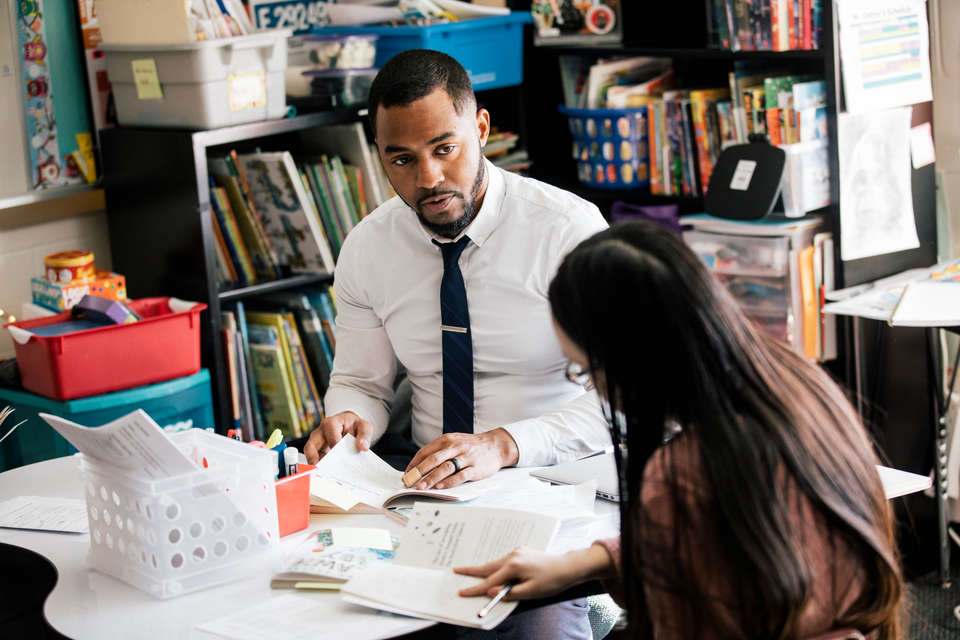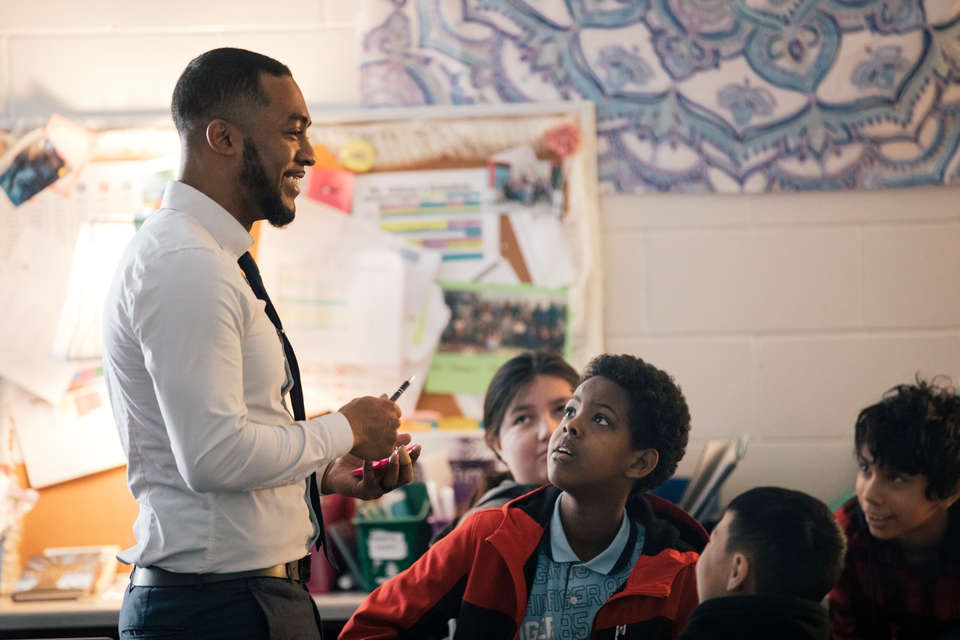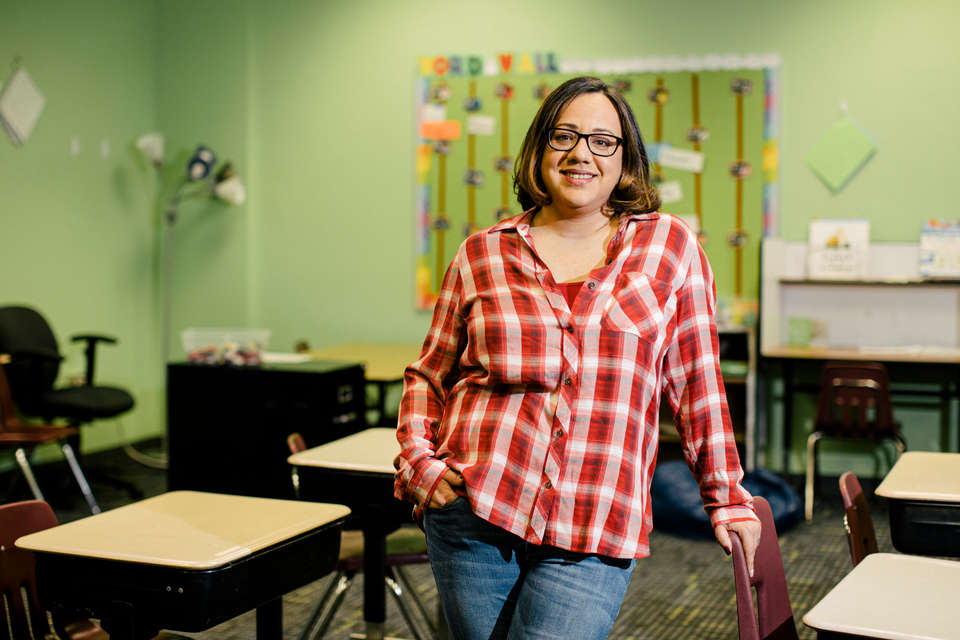Laura Medina Coste began her career at Wellstone Elementary as a secretary. While she loved working at the school and being part of the community, she had a strong desire to teach. Unfortunately, she felt “stuck” because of the time and money it would cost to go back to school. An advanced degree didn’t seem feasible, she said.
Thanks to the St. Paul Public Schools Urban Teacher Residency Program and the University of St. Thomas, Medina Coste was able to achieve her teaching goal. While continuing to work full time and gaining experience in the classroom, she earned her master’s degree in education (along with an academic and behavior strategist license) from St. Thomas in 15 months. Medina Coste is now a special education teacher at Wellstone.
“It just felt like an incredible way to finally go on the path I really wanted,” Medina Coste ’18 MA said. “To keep going with my education and move beyond where I was, so I could do more to help students and help other staff members at the school.”
Medina Coste also is helping to inspire students from underrepresented backgrounds to become teachers.
“It’s important that students see teachers that look like them, because we’ll never grow more teachers of color if students don’t see teachers of color,” Medina Coste said. “I’m an immigrant. I’m Latina. I speak another language – it’s important for students to hear me speak that other language, especially if it’s the same as theirs. And it’s important for students who don’t speak Spanish to hear me speak it.”
Diversifying the teaching workforce
The 2019 Biennial Minnesota Teacher Supply and Demand report found the percentage of teachers of color and indigenous teachers has remained stagnant in the state at 4%, while the percentage of students of color and indigenous students continues to grow. St. Thomas’ School of Education is constantly working to help increase the number of teachers of color in the classroom through various partnerships, including two with state-funded teaching preparation programs – Collaborative Urban and Greater Minnesota Educators of Color, and Grow Your Own (funds from GYO are used in residency programs).
“According to the 2019 Minnesota Teacher Supply and Demand report, Minnesota’s teacher workforce remains steady, with 95.7% of all public school teachers identifying as white, while 33.5% of students in Minnesota public schools are students of color and indigenous students,” said School of Education Dean Kathlene Holmes Campbell. “This statistic is important because recent studies say that African American students who had at least one African American teacher by third grade ‘were 13% more likely to enroll in college – and those who’d had two were 32% more likely.’ We believe that representation matters and children from all backgrounds benefit from having diverse teachers. This is why we’re committed to helping diversify the teaching profession.”
The Collaborative Urban and Greater Minnesota Educators of Color (CUGMEC) scholarship program (formerly known as the CUE grant) is a private/public partnership between the University of St. Thomas and the state of Minnesota designed to recruit, support and retain teachers of color and indigenous teachers. The CUGMEC has been in existence at St. Thomas for nearly 30 years and supported more than 465 participants becoming licensed teachers.
The GYO grant is available to eligible Minnesota districts for use in programs that increase the racial diversity of the teacher workforce. In a partnership with St. Thomas through school residencies (including the St. Paul Public Schools Urban Teacher Residency Program and the Minneapolis Special Education Teacher Residency) and the Work and Learn program, districts “grow their own” educators by investing in people already working for them. Funds from GYO are used in both programs.
“Through Grow your Own, there is a shared investment between the districts and the students,” said Shelley Neilsen Gatti, associate professor in the School of Education’s Department of Special Education. “The district invests in the student through the program, and the student invests in the district by making a commitment to teach in that district for at least three years, and hopefully longer.”
“There is a significant teacher shortage in our state, especially special education teachers and teachers of color and indigenous teachers," Neilsen Gatti added. "This partnership impacts that shortage by preparing effective teachers for their districts. Last spring, the director of special education in one of the districts anticipated this would be the first year that they would start the year fully staffed with licensed special education teachers, due in part to the GYO program.”

School of Education graduate Martin Odima, a teacher at Frost Lake Elementary School, works with fifth graders in St. Paul. Odima was a member of the School of Education’s Grow Your Own program.
Making a difference in the classroom
Frost Lake Elementary special education teacher Martin Odima Jr. is a past recipient of the CUGMEC scholarship. A former paraprofessional, Odima ’13 MA earned his academic and behavioral strategist license and master’s degree in education at St. Thomas through the CUGMEC program.
As an African American male, Odima said there aren’t many people who look like him at his school.
“When students of color see me, there’s a trust and I can build a relationship with them,” Odima said. “There are students who have been challenging in the past who feel they don’t have someone they can trust. I can advocate for them, can speak for them to be in the classroom.”
Odima was drawn to the CUGMEC for many reasons, especially the scholarship funding. He bonded with professors and fellow students, many of whom were also paraprofessionals looking to advance their careers.
“Teachers don’t last long in the profession, especially special education teachers. The average is three to five years. ... The fact I have that strong network with St. Thomas professors and people in the program has given me so many opportunities,” said Odima, who recently co-authored a book chapter on thriving in education with St. Thomas faculty and is an adjunct professor at St. Thomas teaching one of the classes he took in graduate school.
Odima enjoys providing children tools to help them feel successful, build confidence and overcome challenges. A marathon runner, he shares his experiences with students, hoping to inspire them to channel their energy into something they can be proud of.
“If we really want to advance and build success for our students in Minnesota, academically, socially and emotionally, we need to have programs like this [CUGMEC] program,” said Odima, who is also a mentor teacher for St. Paul Public Schools Urban Teacher Residency Program. “Not only does it develop strong teachers, it develops teachers who care, who want to stay in the program, are teachers from different backgrounds and teachers of color. The impact of it makes schools better. I see it. I have the confidence I’m making a big difference every single year. The people that have gone through the program … I’m seeing them go on and being successful. I’m seeing that impact.”

School of Education graduate Martin Odima, a teacher at Frost Lake Elementary School, works with fifth graders in St. Paul. Odima was a member of the School of Education’s Grow Your Own program. (Mark Brown/University of St. Thomas)
Promoting from within
Medina Coste, who participated in the St. Paul Public Schools Urban Teacher Residency Program, which provides stipends from Grow Your Own funding, said it just makes sense to help those who are already working in the schools become educators.
“We lose lots of teachers because they’re brand-new and they don’t have any connections to the district,” Medina Coste said. “These are people who have connections to where they work already. They’re already committed to that place, to that district. They’ve already given a lot of themselves to be there.”
Like Odima, Medina Coste appreciates her shared experience with fellow residency participants and said the connections she’s made with them and the people at St. Thomas have been invaluable even postgraduation.
“As a teacher of color, I need as much support as I can get. Not just from my principal and not just from my district, but from outside of that – from a very specific group of people hoping that I am successful,” Medina Coste said.
“I hope if I ever go beyond being a teacher in the classroom and being a bigger leader within the schools, something I would take with me is to listen and have dialogue about what teachers actually need," she added. "Teachers actually need a Grow Your Own program. Districts, staff, teachers – everyone needs a Grow Your Own program.”







